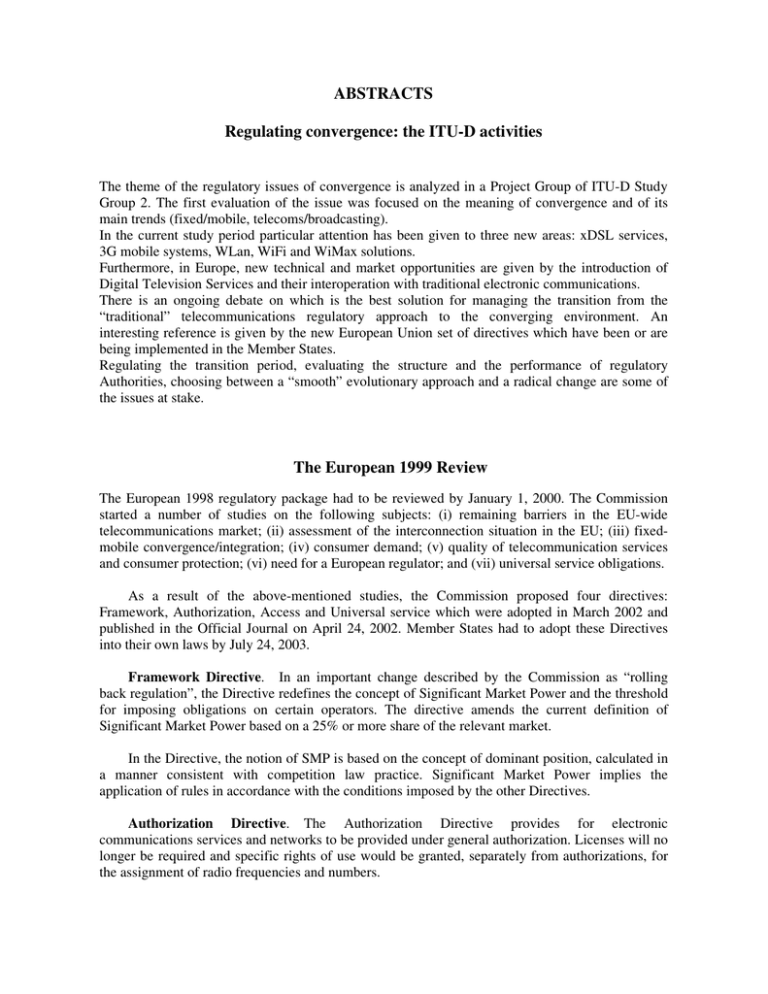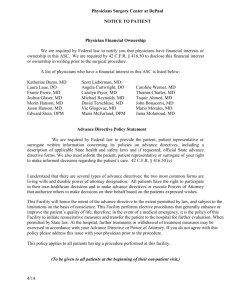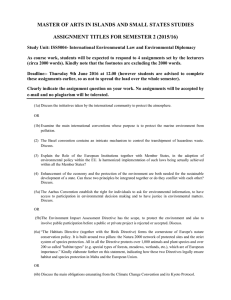ABSTRACTS Regulating convergence: the ITU-D activities
advertisement

ABSTRACTS Regulating convergence: the ITU-D activities The theme of the regulatory issues of convergence is analyzed in a Project Group of ITU-D Study Group 2. The first evaluation of the issue was focused on the meaning of convergence and of its main trends (fixed/mobile, telecoms/broadcasting). In the current study period particular attention has been given to three new areas: xDSL services, 3G mobile systems, WLan, WiFi and WiMax solutions. Furthermore, in Europe, new technical and market opportunities are given by the introduction of Digital Television Services and their interoperation with traditional electronic communications. There is an ongoing debate on which is the best solution for managing the transition from the “traditional” telecommunications regulatory approach to the converging environment. An interesting reference is given by the new European Union set of directives which have been or are being implemented in the Member States. Regulating the transition period, evaluating the structure and the performance of regulatory Authorities, choosing between a “smooth” evolutionary approach and a radical change are some of the issues at stake. The European 1999 Review The European 1998 regulatory package had to be reviewed by January 1, 2000. The Commission started a number of studies on the following subjects: (i) remaining barriers in the EU-wide telecommunications market; (ii) assessment of the interconnection situation in the EU; (iii) fixedmobile convergence/integration; (iv) consumer demand; (v) quality of telecommunication services and consumer protection; (vi) need for a European regulator; and (vii) universal service obligations. As a result of the above-mentioned studies, the Commission proposed four directives: Framework, Authorization, Access and Universal service which were adopted in March 2002 and published in the Official Journal on April 24, 2002. Member States had to adopt these Directives into their own laws by July 24, 2003. Framework Directive. In an important change described by the Commission as “rolling back regulation”, the Directive redefines the concept of Significant Market Power and the threshold for imposing obligations on certain operators. The directive amends the current definition of Significant Market Power based on a 25% or more share of the relevant market. In the Directive, the notion of SMP is based on the concept of dominant position, calculated in a manner consistent with competition law practice. Significant Market Power implies the application of rules in accordance with the conditions imposed by the other Directives. Authorization Directive. The Authorization Directive provides for electronic communications services and networks to be provided under general authorization. Licenses will no longer be required and specific rights of use would be granted, separately from authorizations, for the assignment of radio frequencies and numbers. Upon notification the company can start to operate a network and provide services, provided that it has the right to use radio frequency and numbers if needed. No information should be required prior to, or as a condition for, market access. Nonetheless, Member States could require some justified information (listed in the proposal) from undertakings. Access Directive. The Access Directive represents a significant departure from the previous Interconnection Directive 97/33/EC which sets out common obligations to be followed by Significant Market Power operators in all Member States. Under the directive, national regulatory Authority will have flexibility to select which access and interconnection obligations to impose on operators notified as having Significant Market Power in relevant markets. A maximum list of obligations is contained in the directive. National regulatory Authority will carry out an analysis of the competitiveness of a designated list of relevant product and service markets and identify which operators (if any) have Significant Market Power on any of the particular markets. A national regulatory authority will be able to impose price controls, including obligations for cost orientation of prices and obligations concerning cost accounting systems, for the provision of specific types of interconnection and/or access services. National regulatory Authority will also be able to impose obligations for transparency, nondiscrimination, and accounting separation on Significant Market Power operators in relation to interconnection and/or network access. These obligations are carried over from the current regulatory framework. Universal Service Directive. The Universal Service Directive replaces the existing directive on voice telephony and universal services. The Directive also contains rules on number portability, carrier selection and carrier pre-selection which are currently in the Interconnection Directive. The directive also covers the provision of leased lines and other mandatory services as well as a number of issues concerning users’ rights, such as contracts, tariff transparency and information and quality of service.


